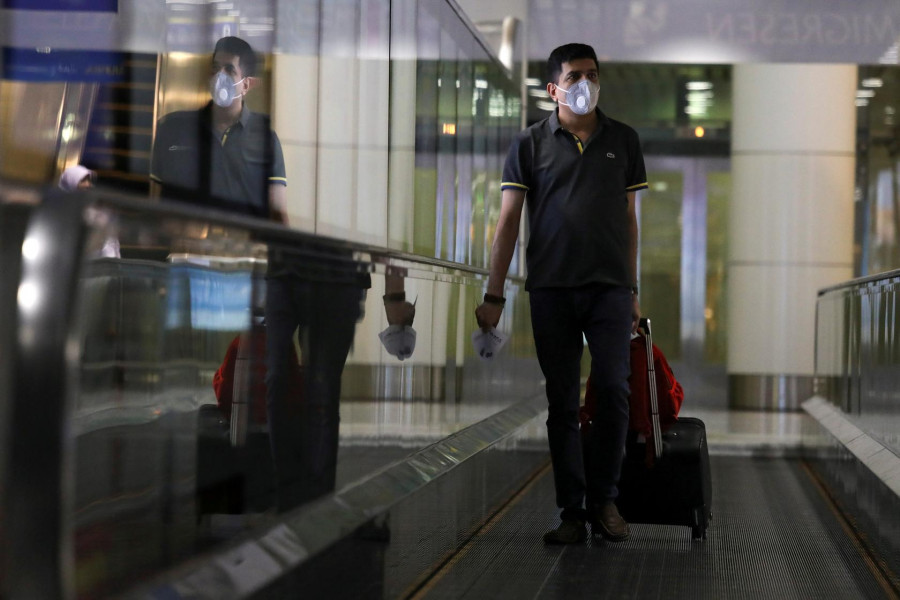As thousands of Nepali migrant workers remain stranded in several countries amid the global Covid-19 crisis, migrants’ rights groups have called on the government to ensure their safety.
A group of 20 organisations, working in the sector of migrant workers’ welfare and safe migration, has said that the Nepal government needs to come forward and make sure its citizens who are in foreign countries for employment are getting adequate health services and have access to basic necessities.
In a joint statement released by the National Network for Safe Migration, these organisations have demanded that the Nepal government should coordinate with its foreign missions to make arrangements to return the stranded workers who want to come home.
“We have been hearing how a large number of workers have been struggling in labour destination countries since the Covid-19 outbreak escalated,” Krishna Prasad Neupane, general secretary of the network, said. “If they want to come back home, then the Nepal government should make logistic arrangements and request the host governments to return these workers safely.”
The global pandemic has affected Nepal’s labour migration sector and tens of thousands of migrant workers and their families back home.
The Nepali workers in the Gulf countries and Malaysia have been feeling the brunt of the Covid-19 pandemic in the form of job cuts and reduced income. Others are forced to work even during lockdowns. Many workers are said to be living in fear of coronavirus infection due to substandard living condition.
“The Nepali missions should study the condition of Nepali workers in labour destination countries and approach the concerned governments for their protection,” Neupane said.
The network has said those who cannot return due to travel restrictions should be kept safely by providing proper health facilities and those who have returned or wish to return should be kept in quarantine.
While a massive labour force is languishing in foreign countries, thousands of aspiring migrant workers have also been affected by the Covid-19 pandemic. The Nepal government has imposed travel restrictions and stopped issuing labour permits for now.
According to the network, the government should introduce a relief package targeting the families of migrant workers too, as the money sent by them in the form remittance continues to paddle the country’s economy.
“Labour migration and remittance have equally been affected by the Covid-19 outbreak. The income of many migrant workers’ families has been affected. It is time that the government took care of the affected families through a relief package,” Neupane said.
Frequently asked questions about the coronavirus outbreak
UPDATED as of September 22, 2020
What is Covid-19?
Covid-19, short for coronavirus disease, is an illness caused by the coronavirus SARS-CoV-2, short for severe acute respiratory syndrome coronavirus 2. Common symptoms of the disease include fever, dry cough, fatigue, shortness of breath and breathing difficulties. In severe cases, the infection can cause pneumonia, severe acute respiratory syndrome, kidney failure and even death.
How contagious is Covid-19?
Covid-19 can spread easily from person to person, especially in enclosed spaces. The virus can travel through the air in respiratory droplets produced when a sick person breathes, talks, coughs or sneezes. As the virus can also survive on plastic and steel surfaces for up to 72 hours and on cardboard for up to 24 hours, any contact with such surfaces can also spread the virus. Symptoms take between two to 14 days to appear, during which time the carrier is believed to be contagious.
Where did the virus come from?
The virus was first identified in Wuhan, China in late December. The coronavirus is a large family of viruses that is responsible for everything from the common cold to Middle East Respiratory Syndrome (MERS) and Severe Acute Respiratory Syndrome (SARS). After an initial outbreak in Wuhan that spread across Hubei province, eventually infecting over 80,000 and killing more than 3,000, new infection rates in mainland China have dropped. However, the disease has since spread across the world at an alarming rate.
What is the current status of Covid-19?
The World Health Organisation has called the ongoing outbreak a “pandemic” and urged countries across the world to take precautionary measures. Covid-19 has spread to 213 countries and territories around the world and infected more than 31,405,983 people with 967,505 deaths and 22,990,260 recoveries. In South Asia, India has reported the highest number of infections at 5,557,573 with 88,943 deaths. While Pakistan has reported 306,304 confirmed cases with 6,420 deaths. Nepal has so far reported 65,276 cases with 427 deaths.
How dangerous is the disease?
The mortality rate for Covid-19 is estimated to be 3.6 percent, but new studies have put the rate slightly higher at 5.7 percent. Although Covid-19 is not too dangerous to young healthy people, older individuals and those with immune-compromised systems are at greater risk of death. People with chronic medical conditions like heart disease, diabetes and lung disease, or those who’ve recently undergone serious medical procedures, are also at risk.
How do I keep myself safe?
The WHO advises that the most important thing you can do is wash your hands frequently with soap and water for at least 20 seconds or use hand sanitizers with at least 60 percent alcohol content. Avoid touching your eyes, nose and mouth with unclean hands. Clean and disinfect frequently used surfaces like your computers and phones. Avoid large crowds of people. Seek medical attention if symptoms persist for longer than a few days.
Is it time to panic?
No. The government has imposed a lockdown to limit the spread of the virus. There is no need to begin stockpiling food, cooking gas or hand sanitizers. However, it is always prudent to take sensible precautions like the ones identified above.





 18.12°C Kathmandu
18.12°C Kathmandu














